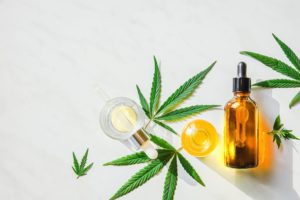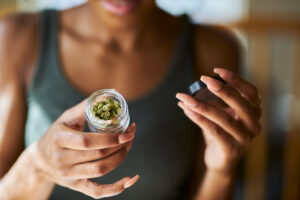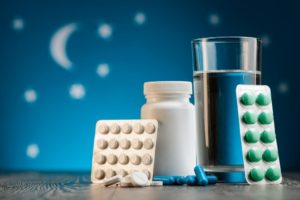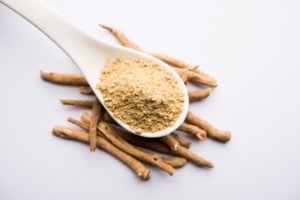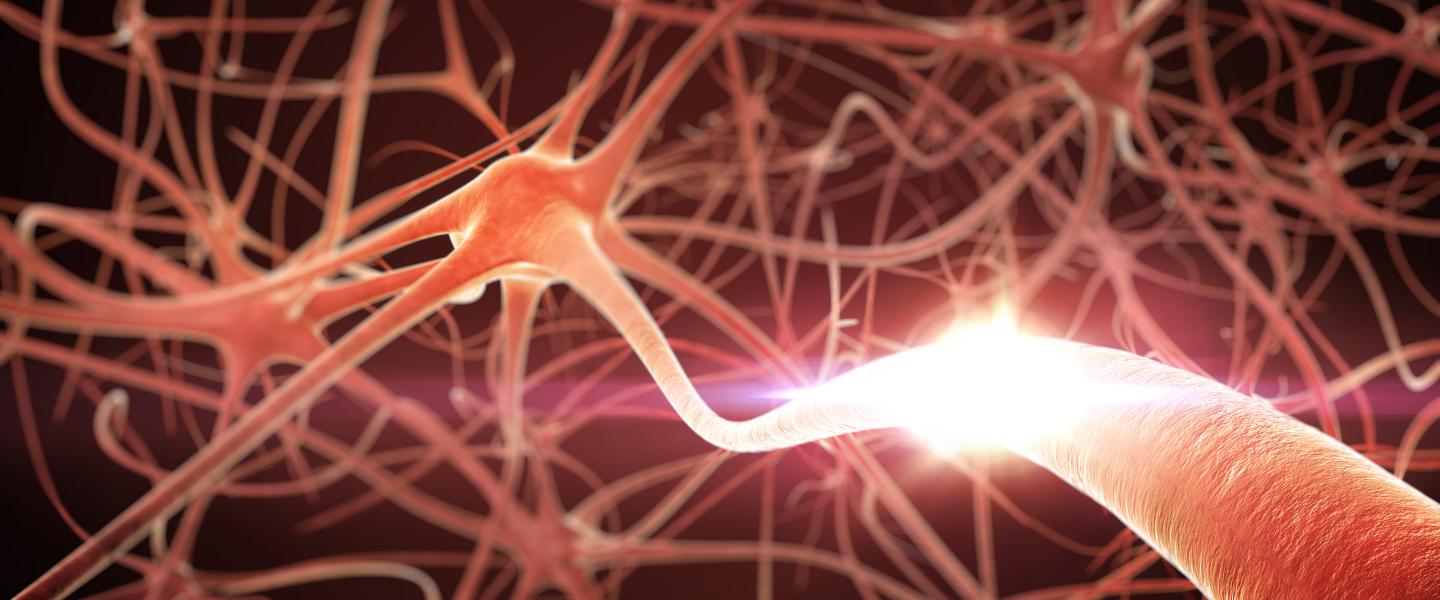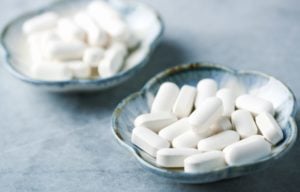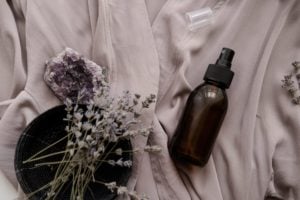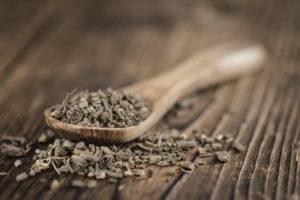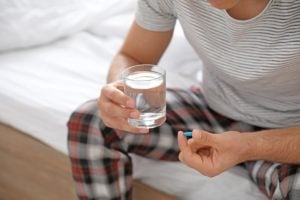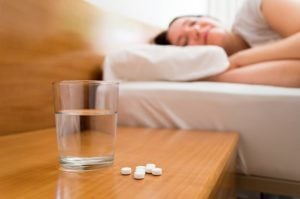L-Theanine for Sleep
- L-theanine is a natural compound found in tea that promotes relaxing brain activity.
- When used in appropriate doses, l-theanine is generally considered safe for most people.
- Consult with a healthcare professional before taking l-theanine supplements for sleep.
L-theanine is a natural ingredient found in tea. Tea is the second-most widely consumed beverage in the world after water. L-theanine is also sold as a dietary supplement in liquid, pill, and ointment forms. Although research into the health benefits of L-theanine is ongoing, studies suggest that L-theanine may reduce anxiety and promote the level of relaxation in the brain needed for high quality, restful sleep.
What Is L-Theanine?
L-theanine is an amino acid that occurs naturally in tea leaves and dissolves readily in water. It also supplies green and black teas with their savory, umami flavor and balances the bitter taste of caffeine in teas.
Amino acids form proteins in the body that serve a variety of vital functions. Unlike other amino acids though, L-theanine does not build proteins. Instead, L-theanine affects neurotransmitters, which are the body’s chemical messengers.
Scientific evidence about L-theanine is still emerging, but researchers believe its role in the body may be to have a soothing effect on the central nervous system, reducing stress and promoting relaxation.
Where L-Theanine Is Found
L-theanine is found in tea brewed from the leaves of the Camellia sinensis plant, more commonly known as green, black, white, or oolong teas. Although L-theanine has also been identified in some mushrooms, tea is the primary naturally occurring source of L-theanine.
One serving of tea contains about 25 to 60 milligrams of L-theanine. The level of L-theanine in an individual cup depends in part on the amount of tea leaves used and the length of time the tea is steeped. The level of L-theanine is highly variable across different tea brands and preparations, but on average green teas contain slightly more L-theanine than black teas.
L-theanine is also available in the U.S. as a dietary supplement. Green tea extracts containing L-theanine and other ingredients are available in liquid, pill, and ointment form.
How Does L-Theanine Affect Sleep?
Research suggests that L-theanine may affect sleep by influencing several neurotransmitters and promoting relaxing brain activity. L-theanine crosses the blood-brain barrier, allowing it to rapidly affect neurotransmitters within the central nervous system. It has a similar structure to glutamate, a neurotransmitter that may play a role in promoting wakefulness.
Animal studies have found that L-theanine blocks glutamate from binding to cells in the brain. L-theanine also affects other neurotransmitters, increasing gamma-aminobutyric acid (GABA), dopamine, and serotonin levels while decreasing levels of norepinephrine. These combined chemical changes may slow brain activity , promote positive feelings , and reduce both alertness and anxiety.
L-theanine may also facilitate sleep through its effects on brain waves. Several studies of the effects of L-theanine on brain activity have found that L-theanine at doses ranging from 50 to 200 milligrams increases alpha brain waves compared to a placebo. Alpha brain waves are the most prevalent brain waves in people who are relaxed or drowsy.
The Relationship Between L-Theanine and GABA
L-theanine and GABA have all been reported to play roles in sleep. While GABA are both made in the human body, L-theanine only comes from outside sources such as tea or dietary supplements.
L-theanine increases the concentration of GABA in the brain. A 2017 study found that mice and rats given a mixture of L-theanine and GABA fell asleep faster and slept longer compared with those that were given either L-theanine or GABA alone. However, no published human studies are currently available on the safety or effectiveness of taking L-theanine and GABA supplements together. People considering taking both supplements should speak with their doctors before starting them.
Side Effects of L-Theanine
The side effects of L-theanine are not well understood, and there is limited data available on L-theanine taken on its own. However, the U.S. Food and Drug Administration (FDA) classifies L-theanine as a food ingredient that is generally recognized as safe up to 250 milligrams per serving.
Tea drinkers and people taking L-theanine as green tea extract should be aware that tea can cause gastrointestinal upset, especially in high doses . Additionally, rare cases of liver problems have been reported in people taking green tea extract.
It is important to keep in mind that both green and black teas contain caffeine. Caffeine is a powerful stimulant that can cause anxiety, irritability, and insomnia. Therefore, caffeinated teas may counteract the sleep-promoting and stress-reducing effects of L-theanine. People drinking green tea for sleep or relaxation may consider decaffeinated or low-caffeine options.
Health experts have not yet established the safety of L-theanine for people who are pregnant or breastfeeding. However, people who consume more than 300 milligrams of caffeine per day during pregnancy have a higher risk of poor pregnancy outcomes . People who are pregnant or breastfeeding should talk to their doctors before taking L-theanine or green tea extract, or increasing their tea consumption.
Interactions Between L-Theanine and Other Medications
Interactions between L-theanine and other medications, supplements, or stimulants are not yet known. However, caffeinated teas should not be taken with other stimulant medications, as the combined effects may cause serious side effects including heart problems.
Tea may also cause interactions with:
- Anti-seizure medications
- Asthma medications
- Antidepressants
- Blood pressure medicine
- Anti-clotting medications
People who take any of these medications should talk to their doctors about the safety of L-theanine or tea with their medications.
Recommended L-Theanine Dosage for Sleep
Experts do not yet know the best dosage of L-theanine as a natural sleep aid. However, published studies suggest that taking 200 milligrams of L-theanine before bed may promote restful sleep. People considering taking L-theanine supplements should discuss the dosage with a doctor.
Tea drinkers should follow dietary guidelines for tea and caffeine consumption. Caffeine content varies across different tea preparations, so tea drinkers should check nutrition labels. The FDA states that most adults can safely consume up to 400 milligrams of caffeine a day .
Parents and caregivers should talk to their doctors about acceptable dosage of L-theanine or consumption of tea for their children or teens.
Medical Disclaimer: The content on this page should not be taken as medical advice or used as a recommendation for any specific treatment or medication. Always consult your doctor before taking a new medication or changing your current treatment.
References
12 Sources
-
Hidese, S., Ogawa, S., Ota, M., Ishida, I., Yasukawa, Z., Ozeki, M., & Kunugi, H. (2019). Effects of L-theanine administration on stress-related symptoms and cognitive functions in healthy adults: A randomized controlled trial. Nutrients, 11(10), 2362.
https://pubmed.ncbi.nlm.nih.gov/31623400/ -
Boros, K., Jedlinszki, N., & Csupor, D. (2016). Theanine and caffeine content of infusions prepared from commercial tea samples. Pharmacognosy Magazine, 12(45), 75–79.
https://pubmed.ncbi.nlm.nih.gov/27019564/ -
MedlinePlus: National Library of Medicine (US). (2018, April 1). GABA-transaminase deficiency.
https://medlineplus.gov/genetics/condition/gaba-transaminase-deficiency/ -
Bakshi, A. & Tadi, P. (2021, July 31). Biochemistry, serotonin. In StatPearls. StatPearls Publishing. Retrieved September 11, 2022, from
https://www.ncbi.nlm.nih.gov/books/NBK560856/ -
Bakshi, A. & Tadi, P. (2022, May 8). Physiology, noradrenergic synapse. In StatPearls. StatPearls Publishing. Retrieved September 11, 2022, from
https://www.ncbi.nlm.nih.gov/books/NBK540977/ -
Kim, S., Jo, K., Hong, K. B., Han, S. H., & Suh, H. J. (2019). GABA and l-theanine mixture decreases sleep latency and improves NREM sleep. Pharmaceutical Biology, 57(1), 65–73.
https://pubmed.ncbi.nlm.nih.gov/30707852/ -
U.S. Food and Drug Administration. (2023, February 27). GRN No. 209: L-theanine.
https://www.cfsanappsexternal.fda.gov/scripts/fdcc/index.cfm?set=GrASNotices&id=209 -
AHFS Patient Medication Information. (2022, July 29). Black tea. American Society of Health-System Pharmacists, Inc.
https://medlineplus.gov/druginfo/natural/997.html -
Larson, A. M. (2021, April 6). Hepatotoxicity due to herbal medications and dietary supplements. In S. Chopra (Ed.). UpToDate. Retrieved September 11, 2022, from
https://www.uptodate.com/contents/hepatotoxicity-due-to-herbal-medications-and-dietary-supplements -
Nisenblat V., Norman R. J. (2021, November 17). Caffeine: Effects on reproductive outcomes in females. In C. J. Lockwood, & D. Seres (Eds.). UpToDate.
https://www.uptodate.com/contents/caffeine-effects-on-reproductive-outcomes-in-females -
National Center for Complementary and Integrative Health. (2020, October). Green tea. Retrieved September 11, 2022, from
https://www.nccih.nih.gov/health/green-tea -
U.S. Food and Drug Administration. (2018, December 12). Spilling the beans: How much caffeine is too much?
https://www.fda.gov/consumers/consumer-updates/spilling-beans-how-much-caffeine-too-much






